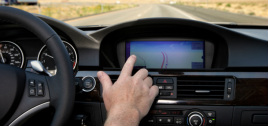
With the rise of in-car technology in the last decade, Pennsylvania courts have struggled to draw a fair line between convenience and safety. In a recent ruling in Lackawanna County, the court has now affirmed that, in certain specific situations, GPS use can be considered reckless conduct and punished with additional, punitive, money owed by the defendant.
In the "common" scenario of car accidents, the issue is whether or not the defendant has been negligent. Negligence is briefly explained as falling short of the standard of a reasonably prudent person" in the situation. For example, driving too close to the car in front of you and rear-ending them when they stop. Negligent conduct is the basis for money damages that must be paid by the defendant. Most damages based on negligence are covered by insurance.
However, courts have long recognized a separate type of conduct: recklessness. The courts will find that a person has been reckless when their conduct goes above and beyond ordinary negligence. When a person acts in disregard of a foreseeable risk of a dangerous outcome, their actions are reckless and they are subject to additional damages assessed against them. These damages, called punitive damages, are typically not covered by insurance in Pennsylvania.
The Lackawanna County court was clear to point out that, for punitive damages, there must be evidence that the driver was looking specifically at their GPS instead of the road. The court specifically mentions that many GPS units are mounted on the dashboard or windshield, and allow the driver to view both the GPS and the road at the same time. In instances where the driver can see the GPS and the road simultaneously, such conduct would likely only be considered negligent, not reckless, if it caused an accident.
If you have been injured in a car accident, our law firm will assess all aspects of your case, from medical bill payment to basic money damages and punitive damages. Be sure to contact us right away if you feel you have been injured due to another person's negligence.
However, courts have long recognized a separate type of conduct: recklessness. The courts will find that a person has been reckless when their conduct goes above and beyond ordinary negligence. When a person acts in disregard of a foreseeable risk of a dangerous outcome, their actions are reckless and they are subject to additional damages assessed against them. These damages, called punitive damages, are typically not covered by insurance in Pennsylvania.
The Lackawanna County court was clear to point out that, for punitive damages, there must be evidence that the driver was looking specifically at their GPS instead of the road. The court specifically mentions that many GPS units are mounted on the dashboard or windshield, and allow the driver to view both the GPS and the road at the same time. In instances where the driver can see the GPS and the road simultaneously, such conduct would likely only be considered negligent, not reckless, if it caused an accident.
If you have been injured in a car accident, our law firm will assess all aspects of your case, from medical bill payment to basic money damages and punitive damages. Be sure to contact us right away if you feel you have been injured due to another person's negligence.
 RSS Feed
RSS Feed
